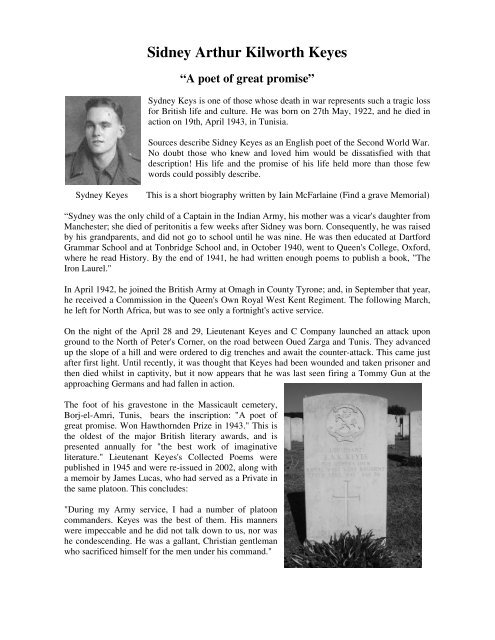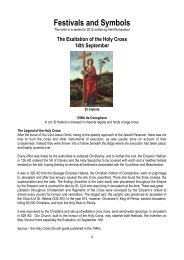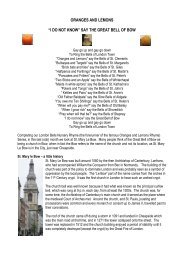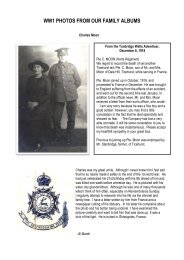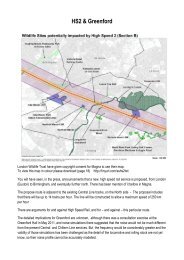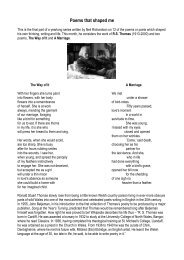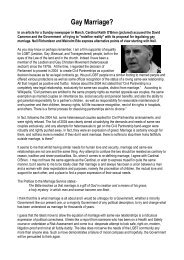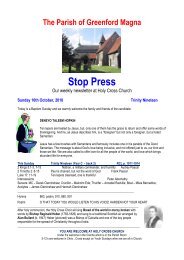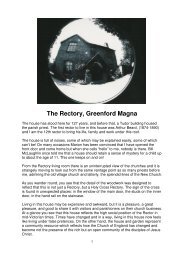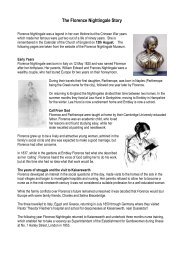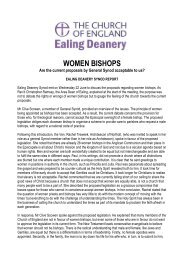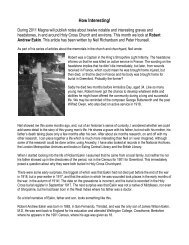Sidney Arthur Kilworth Keyes - The Parish of Greenford Magna
Sidney Arthur Kilworth Keyes - The Parish of Greenford Magna
Sidney Arthur Kilworth Keyes - The Parish of Greenford Magna
- No tags were found...
You also want an ePaper? Increase the reach of your titles
YUMPU automatically turns print PDFs into web optimized ePapers that Google loves.
<strong>Sidney</strong> <strong>Arthur</strong> <strong>Kilworth</strong> <strong>Keyes</strong>“A poet <strong>of</strong> great promise”Sydney Keys is one <strong>of</strong> those whose death in war represents such a tragic lossfor British life and culture. He was born on 27th May, 1922, and he died inaction on 19th, April 1943, in Tunisia.Sources describe <strong>Sidney</strong> <strong>Keyes</strong> as an English poet <strong>of</strong> the Second World War.No doubt those who knew and loved him would be dissatisfied with thatdescription! His life and the promise <strong>of</strong> his life held more than those fewwords could possibly describe.Sydney <strong>Keyes</strong>This is a short biography written by Iain McFarlaine (Find a grave Memorial)“Sydney was the only child <strong>of</strong> a Captain in the Indian Army, his mother was a vicar's daughter fromManchester; she died <strong>of</strong> peritonitis a few weeks after <strong>Sidney</strong> was born. Consequently, he was raisedby his grandparents, and did not go to school until he was nine. He was then educated at DartfordGrammar School and at Tonbridge School and, in October 1940, went to Queen's College, Oxford,where he read History. By the end <strong>of</strong> 1941, he had written enough poems to publish a book, "<strong>The</strong>Iron Laurel."In April 1942, he joined the British Army at Omagh in County Tyrone; and, in September that year,he received a Commission in the Queen's Own Royal West Kent Regiment. <strong>The</strong> following March,he left for North Africa, but was to see only a fortnight's active service.On the night <strong>of</strong> the April 28 and 29, Lieutenant <strong>Keyes</strong> and C Company launched an attack uponground to the North <strong>of</strong> Peter's Corner, on the road between Oued Zarga and Tunis. <strong>The</strong>y advancedup the slope <strong>of</strong> a hill and were ordered to dig trenches and await the counter-attack. This came justafter first light. Until recently, it was thought that <strong>Keyes</strong> had been wounded and taken prisoner andthen died whilst in captivity, but it now appears that he was last seen firing a Tommy Gun at theapproaching Germans and had fallen in action.<strong>The</strong> foot <strong>of</strong> his gravestone in the Massicault cemetery,Borj-el-Amri, Tunis, bears the inscription: "A poet <strong>of</strong>great promise. Won Hawthornden Prize in 1943." This isthe oldest <strong>of</strong> the major British literary awards, and ispresented annually for "the best work <strong>of</strong> imaginativeliterature." Lieutenant <strong>Keyes</strong>'s Collected Poems werepublished in 1945 and were re-issued in 2002, along witha memoir by James Lucas, who had served as a Private inthe same platoon. This concludes:"During my Army service, I had a number <strong>of</strong> platooncommanders. <strong>Keyes</strong> was the best <strong>of</strong> them. His mannerswere impeccable and he did not talk down to us, nor washe condescending. He was a gallant, Christian gentlemanwho sacrificed himself for the men under his command."
His published works include the following:-* Eight Oxford Poets (1941) edited with Michael Meyer* <strong>The</strong> Iron Laurel (1942)* <strong>The</strong> Cruel Solstice (1943)* Collected Poems (1945)<strong>The</strong> reason I am writing about his is that I recently came across one <strong>of</strong> his poems in an anthologyand it triggered a steam <strong>of</strong> memories and a flood <strong>of</strong> feelings.I remembered that one <strong>of</strong> his poems thrilled me as a young student. I was at Secondary school, and Ican imagine myself now in the very classroom, set <strong>of</strong>f the main hall, as I slowly started the process<strong>of</strong> understanding the world and its music and literature, a process which continues unabated today!My English teacher was called Helen Russell. She was a young and attractive teacher who couldmake sentence analysis and parsing positively fascinating. Of course, when it cam to poetry, shewas a natural and her teaching was fluent and engaged her pupils from start to finish. My awareness<strong>of</strong> this vital art form stems from dear Helen Russell and I have always been thankful to her for whatshe did in the classroom, day by day, year by year. I managed to stay in touch until about 1970, butthen seemed to lose contact, and I am so sad about that.<strong>The</strong> poem in question was a valedictory for William Wordsworth and the poet could only have beendead for 10 or so years as I read his verse in the classroom in the 1950s. I came cross it againrecently and it brought back warm memories <strong>of</strong> my young days and that lovely teacher. It alsoprovided a sharp reminder <strong>of</strong> just how tragic life was for my parents’ generation, who sufferedthrough two horrendous world wars and the great depression, and then felt left behind by all thenew things <strong>of</strong> the 1960s.Here it is, a poem which recalls the great poet William Wordsworth, the poet Laureate from 1843until his death in 1850 and it is, in a special way, a memorial tribute to them both- one who realisedhis genius and one who died too soon to make his full contribution.Neil RichardsonNo room for mourning; he's gone outInto the noisy glen, or stands between the stonesOf the gaunt ridge, or you'll hear his shoutRolling among the screes, he being a boy again.He'll never fail nor dieAnd if they laid his bonesIn the wet vaults or iron sarcopohagiOf fame, he'd rise at the first summer rainAnd stride across the hills to seekHis rest among the broken lands and clouds.He has a stormy day, a granite peakSpearing the sky; and look, about its baseWords flower like crocuses in the hanging woods,Blank through the dalehead and the bony face.<strong>Sidney</strong> <strong>Keyes</strong> 1922-1943William Wordsworth


